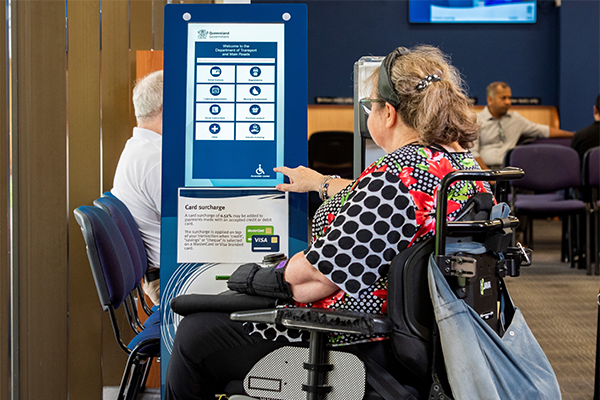Definitions

For TMR as a network provider and employer, accessibility and inclusion focuses on connected, easy experiences and equality of opportunity.
The following definitions for accessibility and inclusion were collaboratively developed through consultation with a diverse group of customers, employees, government and private delivery partners across Queensland.
Accessibility: Accessibility means being able to use the full range of services and products. It means having services that are functional and designed to allow access for all. It results in a connected and easy experience.
Inclusion: Inclusion is about everyone feeling confident and safe when accessing services and facilities. It means being included and having equality of opportunity.
Other common terms used throughout the strategy
Accessible design: Designing for equal useability for all with regard to mobility, facilities, devices and services, and incorporating disability access standards.
Assistive technology: Engineering that supports improved access for people with disability to complete tasks by increasing, maintaining or improving the functional capabilities and independence to facilitate accessibility and participation.
Barrier-free design: Constructing or retro-fitting infrastructure and vehicles to eliminate barriers and obstacles that would otherwise restrict the range of users and purposes for which the space can be used.
Co-design: Co-design is a design methodology/process that actively involves customers and stakeholders in the design process. Designing together ensures that the solutions implemented appropriately consider customer and stakeholders’ respective needs.
Department of Transport and Main Roads (TMR): The Department of Transport and Main Roads moves and connects people, places, goods and services safely, efficiently and effectively across Queensland. We plan, manage and deliver Queensland’s integrated transport environment to achieve sustainable transport solutions for road, rail, air and sea.
Functional: Designed to meet the needs of the end user and achieves its intended purpose.
Inclusive design: Designing services, information, products and infrastructure for the needs of the widest possible audience.
Integrated transport network: Integration of public and private sector transport services and all modes of transport, including active modes such as cycling and walking.
Life stage: Life stage refers to the phases that people pass through over the course of their lives. Typical life stages include infancy, childhood, adolescence, adulthood, and old age.
Mobility as a Service (MaaS): Mobility as a Service describes a shift away from personally-owned modes of transportation towards mobility solutions consumed as a service. MaaS combines public and private transportation services. It is based on personalised journey planning through an application.Network: This refers to all transport products, services, information and infrastructure across Queensland.
Project lifecycle: Project lifecycle is the sequence of stages that a project goes through from beginning to end.
Trans-generational design: Improving quality of life for people of all ages and levels of mobility both now and into the future.
Universal Design: Universal Design is a framework for the design of living and working spaces and products benefiting the widest possible range of people in the widest range of situations without special or separate design.
- Last updated 16 July 2020

